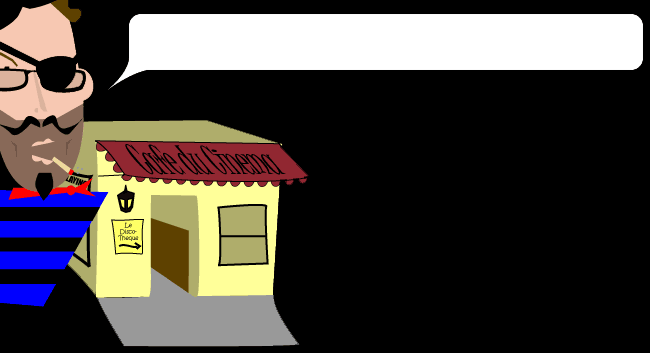This is intended to be the first part in a series of "How To's" - my hope is that I might share with you some of my experiences and in return, those of you who specialize in various elements of the production process can contribute to future articles -- jim
Unless your parents are of the 'liberal' mindset, take note of the strained looks that wash over their faces when you tell them you want to go to film school - a swift kick to the knee would be more welcome. While I'd never say anything to discourage your dreams of canvas backed chairs and megaphones, monocles and flared pants (which we all know are staples of the industry), if I could sit down with a younger me and have a chat, I'd be the first to tell myself to avoid an education in film.
"Take it from me," I'd tell my skinnier, bespectacled self, "I've been there - twice. And film school is not worth your time or money."
"And cut your hair."
Then I'd reach into a bag and pull out the books I wish I had read then, books which would allow even the most dense of film school entrants to learn what they need to know to start down the road to a (hopefully successful) career in film -
Breaking Through, Selling Out, Dropping Dead, and other notes on Filmmaking - William Bayer
It's rare that within the same book, one finds a man who is both poetic in his esteem of the world around him and within that world his craft, and not made so soft by this vision that he pulls punches. Bayer gives it to you straight, on a myriad of topics, arranged alphabetically within these pages for easy consumption. Take for instance, Selling Out, of which he writes :
The entire text reads in one or two sittings, and when the reader is done, he has been rehearsed to a great extent as to what to expect when finally entering the trenches of film production.
Film As Art - Rudolf Arnheim
Film. Art. Gestalt art theorist and critic Rudolf Arnheim brings the two to the reader as a science with the ease of a wise and intense teacher. While casting a net wide enough to touch both aesthetics and say, the psychology of the human perception of images, the book rarely looses its brisk pace and always surprises the reader with Arnheim's laser-accurate reflections and musings on the craft.
Rebel Without a Crew - Robert Rodriguez
The validity of Rodriguez's claims of producing a feature film on a mere $7,000 has been seriously undermined in the time that has passed since the publication of this book (and the first screenings of the film in question, El Mariachi.) Still though, the story is a fascinating read and provides a view into the world of low-budget filmmaking the same way that William Goldman's Adventures In the Screen Trade did for the world of screenwriting years before. The key here is low-budget, a term that, unless your uncle's got a spare million lying around, is one I suggest you get acquainted with. Not only does the appendix entitled "The Ten Minute Film School" serve as an initiation into the fine art of moviemaking on the cheap, moreover it serves as a much needed pep talk for anyone who sets themselves down the path to becoming a filmmaker.
Hitchcock - Francois Truffaut
It would be enough to fill a book entirely with a series of lengthy interviews with Hitch, but to have the interviewer be no less than the ever perceptive Francois Truffaut is a gift. Truffaut, acting as Hitchcock's personal cheerleader for a number of years at Cahiers du Cinema, was able to steal "The Master" away for an interview totaling some fifty-odd hours of talk time. The book recounts Hitch's career, film by film, from the circumstances surrounding each film's inception, through Hitch's assessment of their success or failure once released. Chock full of observations and asides, the reader rarely fails to leave a chapter without learning something invaluable.
My Life and My Films - Jean Renoir
The pages of this book breathe with life, teeming with the energy of this soft-spoken poet of images. If the above texts are instructional in how to make movies, then this book lends momentum to the reasons why we make movies. If it is hard to come by, I suggest you try the net.
back.
